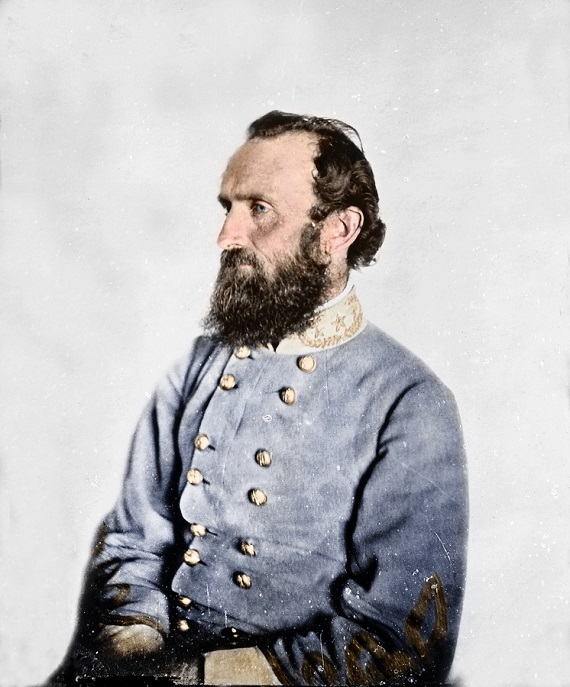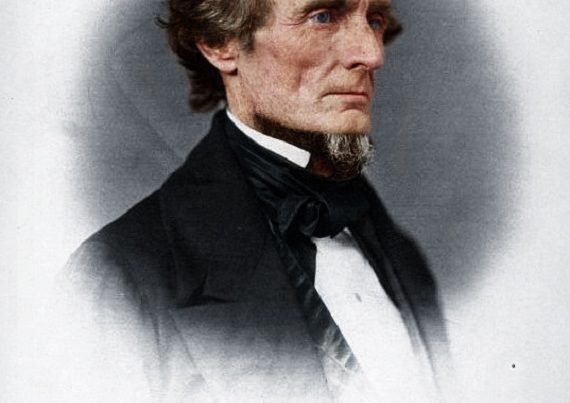Henry Wemyss Feilden, born in England in 1838, was the younger son of Sir William Feilden, a baronet. Young Henry entered the British Army, and after serving in India and China for a number of years, he decided to resign his commission and volunteer for service in the army of the Confederate States of America. On a winter night in early 1863, he completed a dangerous voyage from the island of Nassau, slipping through the Federal fleet bottling up Charleston harbor, and ran the blockade to begin his career in the Confederacy. To obtain a commission in the army, he had to go to Richmond, where he met with President Jefferson Davis, who offered him the rank of captain and the post of adjutant general in any department he chose. Feilden chose Charleston, and became an officer on the staff of General P.G.T. Beauregard, whom he greatly admired. Before leaving Richmond, Feilden made a trip to see another Confederate general he also revered, General Thomas J. Jackson.
In a letter to a relative in England, Feilden wrote:
“I am so pleased with my meeting with the celebrated Stonewall Jackson, so anxious to let you know about him, that I cannot write any further without bringing him to your notice. I brought a box of goods for him from a gentleman in Nassau, and the General asked me to come to his camp and see him when I was in Richmond. I left the city one morning about 7 o’clock, and about 10 landed at a station distant some 8 or 9 miles from Jackson’s…camp. A heavy fall of snow had covered the country for some time before to the depth of a foot, and had formed a crust over the Virginian mud…To crown this, the day before had been mild and wet, and the day I went to camp the rain came down with redoubled fury…I stumbled through mud, I waded through creeks, I passed through pine woods. Wet through, I got into camp about 2 o’clock and made my way to a small house—the General’s Head Quarters. I wrote my name, gave it to an orderly and was immediately told to walk in. The General rose and greeted me warmly—he is so simple and unaffected in his ways and habits. I cannot illustrate this better than by telling exactly what he did—he took off my wet overcoat with his own hands, made up the fire, brought wood for me to put my feet on to keep them warm whilst my boots were drying, and then began asking me a great many questions on many subjects. We had a very pleasant conversation till dinnertime when we went out and joined the members of his Staff. At dinner the General said grace in a fervent, quiet manner that struck me much; there is something about his face that you cannot help reverencing. He is a tall man, well and powerfully built but thin, with a brown beard and hair; his mouth is very determined-looking, the lips thin and compressed firmly together; his eyes are blue, dark, with a keen and searching expression in them; his age is 38 and he looks about 40… After dinner I returned to his room and he again talked to me for a long time. The servant came in and took his mattress out of a cupboard and laid it on the floor. As I rose to retire the General said, ‘Captain, there is plenty of room in my bed, I hope you will share it with me.’ I thanked him very much for his courtesy, but said goodnight, and slept in a tent, sharing the blankets of one of his aides-de-camp. In the morning at breakfast I noticed the General said grace before the meal with the same fervor as I had remarked before. An hour or two after it was time for me to return to the Station. This time I had a horse, and I turned up to the General’s Head-quarters to bid adieu to him. His little room was vacant so I stopped in and stood before the fire; I noticed my great coat stretched before the fire on a chair shortly after the General entered the room. I was saying goodbye, and as I finished he said, ‘Captain, I have been trying to dry your great coat, but am afraid I have not succeeded very well.’ That little act shows the man, does it not! To think that in the midst of his duties, with the cares and responsibilities of a vast army on his shoulders, with the pickets of a hostile army almost within sight of his Quarters, he found time to think of and to carry out these little acts of thoughtfulness!
He is the darling of his men, the pride of them all; they never seem to tire of talking of him. I am told by officers of his staff that if ever a man breathed who was perfectly pure and virtuous it was Jackson; no one seems to think that he could do a wrong as a Christian. I believe his moral character, like that of General Lee, is spotless, as far as a human man’s can be.”
A friend of Captain Feilden who attempted to write a biography of him after his death, speculated on Feilden’s reasons for fighting for the Confederacy, surmising that “it was but natural that the gentlemen of England as a whole should side with the Confederacy, for the children of their own forefathers held closest to historic tradition, and had the bluest blood. Chivalry alone would have impelled them to sympathy with the South; they knew she was fighting against long odds.”
Captain Feilden was not the only Englishman to fight for the Confederacy, and there was considerable support for the new Southern republic in his native country. Stonewall Jackson had many admirers among the British, some of whom financed the beautiful bronze statue of the general which was unveiled in Richmond, Virginia, in 1875. Despite all this, official recognition from the British government was never granted to the Confederacy. In his book The Glittering Illusion, Sheldon Vanauken argued that, although the sympathies of the British were largely with the South during the war, their persistent belief that the South could not be defeated kept them from intervening in the conflict, or even offering recognition of the Confederacy. The Times of London, and all England, Vanauken maintained, “were in the grip of the glittering illusion, that Jefferson Davis had made a nation. Without England’s having to risk a single warship, the end—desired as well as expected—of the disintegration of the American colossus and the establishment of a potential ally was virtually a fait accompli.”[1]
[1] Vanauken, The Glittering Illusion, 133. Vanauken contended that England saw the South as aristocratic and thoroughly English, especially Virginia and the Carolinas.







Are the dates correct? You say he slipped through the blockade in late 1863!? he was killed in action in May 1863.
Mrs. Stokes,
This is a very interesting piece, and I thank you for writing it. It contains, however, a factual error, which is perhaps the product of a mere typo. You state that Capt. Feilden “[o]n a winter night in late 1863…completed a dangerous voyage from the island of Nassau,” then later met Beauregard and “another Confederate general he also revered, General Thomas J. Jackson.” Yet, Stonewall Jackson died on May 10, 1863, several months before you claim Capt. Feilden completed his voyage from Nassau. The reader is left to wonder when, in fact, the voyage from Nassau *did* take place. Was it the winter of 1862?
Houston